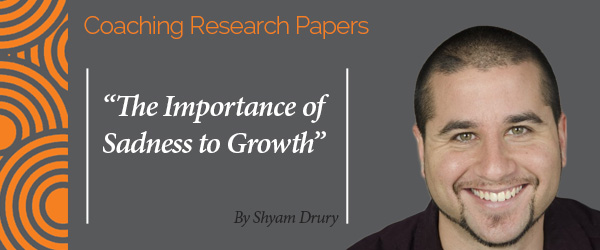Research Paper By Shyam Drury
(Spiritual Coaching, AUSTRALIA)
Sadness to me is the happiest time, When a shining city rises from the ruins of my drunken mind. Those times when I’m silent and still as the earth, The thunder of my roar is heard across the universe. Rumi
In this article, I consider the importance of sadness to personal development and spiritual evolution, in other words, to growth. As coaches, we are there to support our client’s growth, therefore, I feel it is important that we are able to hold space for their sadness when necessary.
Firstly, I look at the reasons why we avoid sadness, our fears and the genuine dangerous side effects of prolonged unresolved sadness. Then I go on to consider how sadness acts an essential part of our growth, through redirecting our focus toward examining important issues and answering critical questions. This prevents a conundrum, in that sadness is both dangerous and necessary, I attempt resolution of this conundrum by proposing it is mostly a particular response to sadness that leads to the harmful effects, namely, rejection, and offering the alternative, acceptance. Finally I conclude with a discussion of some of the powerful benefits that come from the experience of sadness and then a brief discussion on how to support growth through sadness within our coaching practice.
The threat of sadness
When we begin to feel sad, our usual instinctive response is to find a means to avoid or divert the feeling. We may attempt to numb the feeling or distract ourselves from it by eating, sleeping, watching television, engaging in sexual activity or seeking conversations that avoid discussing the subject of our sadness, or finding some way of ‘cheering up’. All of this effort is driven by the simple desire to not have to experience the uncomfortable sensation of sadness. We might be temporarily successful at diverting our attention and avoiding the feeling, but if our sadness is not properly met, it will rob the things we normally enjoy of a wholehearted, contented pleasure. They will feel empty, simply because underneath them is a deeper emptiness we are ignoring.
Discomfort in and of itself, is not necessarily such a bad thing: we well know that enduring discomfort can be necessary in the attaining of goals, such as when we apply disciplined practice to exercise, meditation, study and so forth. What allows us to endure the discomfort (and sometimes even enjoy, as in the case of avid exercisers who seek the ‘burn’) is the knowledge of the benefit that this endurance leads to. Understanding the benefit of the process of sadness allows us to accept and appreciate the discomfort we feel in the experience. We will look more at this later in the article.
Greater stress comes from the worry that when we are sad, we will be stuck in this state indefinitely. Because the nature of deep sadness or depression is a feeling of emptiness, the loss of familiar understandings and structures in life, and the vanishing of enthusiasm, it is natural for us to feel like we cannot get out, and sometimes feel desperate for escape. In its extreme we may even consider suicide as a way of escaping this feeling. 1
When we are stuck in sadness, over a long period of time, so that it becomes depressive, this can have serious effects on our mental health, physical health, physical appearance and personal relationships. Among the mental health symptoms are forgetfulness, listlessness, lack of motivation, despair and discouragement. We may even become more prone to physical accident due to their preoccupation with our sadness. The stress induces a rise in blood pressure and blood sugar, putting our bodily chemistries out of balance, in turn leading to many short-term and longterm illnesses. We lose expression in our face and voice and others close to us may experience despair and also guilt at not being able to help us.2 Considering all of this, we have valid reason to fear the sad or depressive state, however, as I will argue later, I believe these kind of problems are created not simply by the sadness, but by our resistance to it, failing to allow our melancholy to run its natural process on the soul, and give the gifts it has come to deliver. Firstly, we will consider in an immediate sense, why experiencing sadness is so important to our growth.
